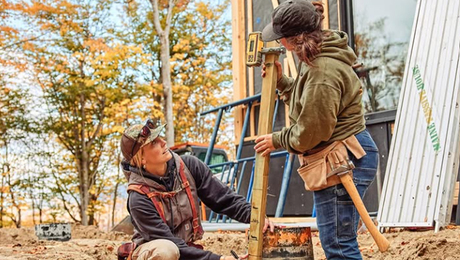Are Trade Shows Worth the Trouble?
This builder says there's nothing like an in-person event where you can learn from luminaries, talk with tool and material manufacturers, and network with your peers.
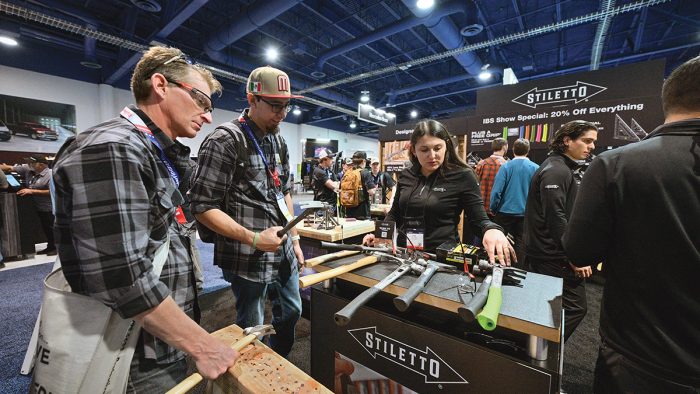
Fernando Pagés Ruiz makes a case for the value of in-person industry events for builders, contractors, and related professionals. Through personal stories and insights from tradespeople, he explains how building industry trade shows provide unique opportunities for learning, networking, and product discovery that online resources can’t match.
From major national events like the International Builders’ Show to smaller local shows, each type of event serves different professional needs, whether through hands-on learning, product comparisons, or specialized training. The article includes a list of shows that outlines what they offer, where they’re held, who should attend, and associated costs—helping readers identify events that align with their professional goals.
Make Trade Shows Part of Your Journey
My journey into the building trades was unconventional, without a formal apprenticeship or trade school education. I took three essential steps. First, I learned on the job under the guidance of exceptional mentors.
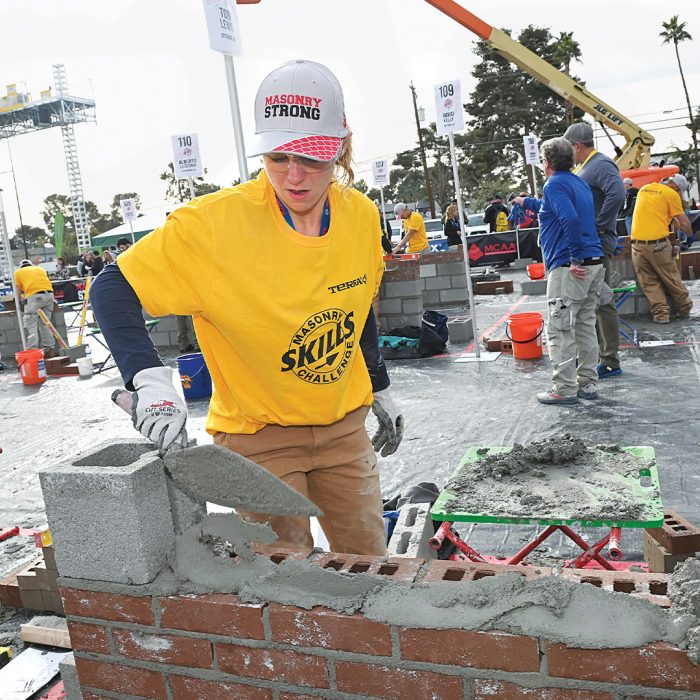
Second, I devoured publications like this one, which provided me with knowledge and inspired me with new ideas. The third step—attending building industry events like the International Builders’ Show (IBS)—set me on a path of continuous personal and professional development.
In-person events, large and small, are not just product showcases—though many tool and building-material manufacturers exhibit at them, giving you the opportunity to speak with the people who know the products best. They are immersive learning experiences that foster a sense of community.
Some events lean more toward classroom-type education, some have hands-on demonstrations, and others are more of an expo, so do your research before deciding which is right for you. But be sure that if you attend a conference or a trade show, it will likely be time and money well spent, as well as an invaluable networking opportunity.
And you don’t have to take it from me.
Life-Changing Experiences
I’ve been to lots of trade shows and conferences, and I’ve researched even more for this article. It seems that today there are more live events happening in our industry than ever before. I wanted to see if my colleagues share my experience and value the opportunities that can only be found at in-person industry gatherings.
I started with mason Rob Balfanz. When Rob was looking for advice on how to expand his career, his father recommended attending a trade show.
“I constantly questioned if I was in the right place and going down the right path,” said Rob. “My father and a few other mentors suggested that if I had questions, I should ‘ask the best of the best’ and get myself to events where I could ask the experts. So I did … and I still do!” Balfanz’s story underscores the importance of networking at these events, a sentiment echoed by many in the industry.
Builder Rick Schwolsky is a veteran of the trade-show floor and a green-building legend, having installed solar panels on the White House roof in 1976. He described his first experience at IBS in 1980 as transformative. “It was an eye-opening experience, but it was also intimidating,” he said, because many of the builders he met at the show had far more experience, and some were building hundreds of homes annually while he built just a few.
However, the show inspired Schwolsky, and eventually the education and networking opportunities it offered paid off and boosted his confidence. Schwolsky remembered eventually thinking, “I may only build five to eight a year, but [look at my] net profit.” Many builders have to work harder to build their business skills than their trade skills, Schwolsky said. And IBS was one of the places where he honed those skills.
New Knowledge Around Every Corner
Having attended IBS about 25 to 30 times, he highlighted the evolving focus on sustainability and the crucial role of the show floor in product selection and knowledge development. “The show floor is a good way to build [understanding], and not just accept the sales pitch [of manufacturers],” he said. “Compare products and learn about them so you can pass that knowledge on to your clients.”
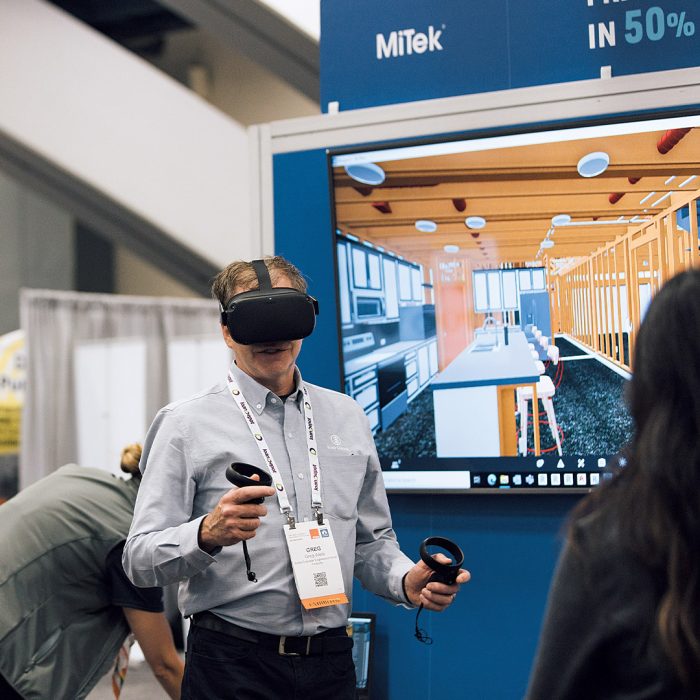
Chris Heim, a New York architect, told me, “I go to trade shows to get a broad survey of what is coming next in building products and systems and to think about how those might benefit any of my upcoming projects. There’s nothing like seeing samples and mockups in person and speaking face to face with vendors.”
Similarly, Gerri Witthuhn, architectural innovation manager with Pacific Lifestyle Homes in Vancouver, said, “The last trade show I attended offered a wealth of vendors and courses centered around green materials.” On a hunt for sustainable cladding, Witthuhn discovered, compared, and analyzed new forms of siding that had never appeared in her online searches.
The dynamic environment of a trade show significantly boosts the discovery and exploration of new design concepts, “which is essential for staying ahead in the field,” Witthuhn explained.
Travis Brungardt of Catalyst Construction in Prairie Village, Kan., had a life-altering experience at the 2019 Fine Homebuilding Summit, which inspired him to start his own Building Science Symposium series in the underserved Midwest. Travis recognized the thirst for building science knowledge and founded a nonprofit with partner Joe Cook.
Building Communities
The Building Science Symposium began at a brewery in Kansas City. Attendees came from twelve states, hungry to deepen their knowledge of best practices in home building. They later expanded the event to a handful of cities each year, and found a community of like-minded builders everywhere they went.
“That’s the most important thing about what we do,” said Travis. “We serve the community of builders and tradespeople by bringing some of the best presenters on critical topics to those who seek to build better.” Industry partners sponsor each event, and the organizers donate all the proceeds from attendees to Skills USA, Keep Craft Alive, and local trade schools. They’ve raised nearly $100,000 so far.
That Drywall Guy, Myron Ferguson, has been a fixture at JLC Live for over 25 years. “At the show, I feel like I am part of something really good,” he said. “Everyone is there to learn, teach, interact with peers, and see and touch the latest tools and products—and everyone seems to be pretty pumped up. ”
Everyone agreed that attending home-building industry events is a worthwhile investment, whether you want to expand your skills, stay updated on trends, or connect with like-minded professionals.
What Show Is Right for You?
If you have not yet attended a home-building event, consider the granddaddy of them all, IBS, now held annually in Las Vegas, usually in late February. National home-building and remodeling shows like IBS offer the opportunity to see the widest variety of products from national and international manufacturers.
These annual shows are typically held in cities that can accommodate massive conventions, such as Las Vegas and Orlando, Fla. Spanning vast convention-center floors, they feature seemingly endless exhibits showcasing the latest construction materials, tools, and technologies.
No other events offer the same learning opportunities, with plenary sessions, classes ranging from running a building business to understanding the building codes, live demonstrations on essential building skills, organized networking sessions, parties, and more. But there is a downside: You may find a product you love only to discover it’s unavailable in your local area.
Plan Ahead of Time
What should you do at such a mammoth event as IBS? Everything! It’s easy to get disoriented, so I preview the exhibitors’ list online to pick out the vendors I want to visit. I organize my list by convention hall so I can wander each of the halls, aisle by aisle.
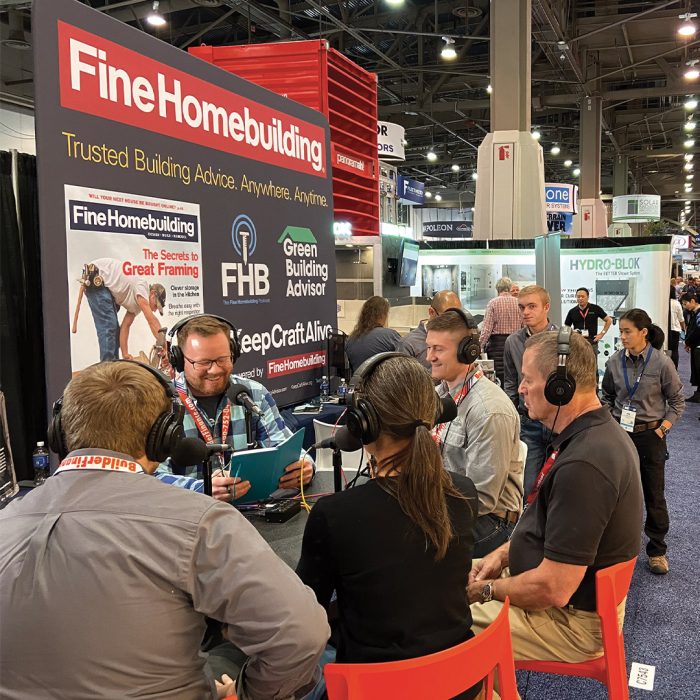
I have specific stops in mind, but I’m open to moments of serendipity when I spot something unexpected on my way to the booths I planned to visit. Beyond the exhibits, I also audit classes. In years past, I have discovered and learned about frost-protected shallow foundations, alternative approaches to structural wall sheathing, and how to design a critical path schedule for project management.
The educational offerings have been essential to my professional growth, and attendees can access sessions online after the show. Since I am always searching for new things, I like to visit the New Product Zone and the Start-Up Zone, where companies debut their latest offerings and inventions.
In the New Product Zone I discovered new cladding from Rise Siding made of recycled carpet, and a new type of flathead screw from U2 Fasteners. At the Start-Up Zone, I watched the Renovate Robotics AI roofer place and nail shingles on a steep slope for a safer installation method.
Go Local
If you’re not interested in such an immersive experience, consider a more regional or very local event. Regional shows, like the Pacific Coast Builders Conference (PCBC), cater to specific geographic areas and offer a blend of national and local exhibitors while they emphasize education around issues and challenges specific to builders who work in the area.
This regional focus ensures these conferences are substantial enough to attract national brands and speakers, yet remain particularly relevant for professionals dealing with regional climates, housing types, and hazards. This broad appeal and regional specificity make these events invaluable for professionals in the area.
Local shows like the Suburban Boston Home Shows meet community-specific needs and provide a more intimate setting for networking with contractors and local suppliers. Attending local events offers numerous benefits, including networking with resident industry professionals and potential clients. You can also gain insights into your competitors, assess market conditions, and identify business opportunities. Local shows are a good place for nonprofessionals to learn, get ideas, and meet local professionals.
More Shows to Love
And there are still more. Some events, like the National Home Performance Conference, focus on a specific topic or industry within the world of construction. These events can be great for subtrade professionals and builders looking to deepen their understanding of one aspect of their work.
Doug Horgan, vice president of best practices and co-owner of BOWA, a high-end Virginia remodeling company, has been attending the National Home Performance Conference for years and says it is “an unmatched opportunity to learn from some of the best minds in residential construction.”
Each type of event offers distinct opportunities tailored to different scales of professional engagement in the home-building industry. I hope this article helps you choose an event that’s right for you, and I hope to see you in a class or on the trade-show floor.
— Fernando Pagés Ruiz is a builder and an ICC-certified residential building inspector active in code development. Photos courtesy of the respective events, except where noted.
From Fine Homebuilding 328
RELATED STORIES
- Trade Shows
- Exploring Innovation at Batimat: A European Perspective on Building Excellence
- Building Science Symposium
Fine Homebuilding Recommended Products
Fine Homebuilding receives a commission for items purchased through links on this site, including Amazon Associates and other affiliate advertising programs.

BOSCH Compact Router (PR20)
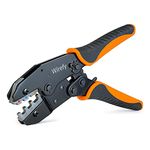
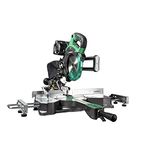
Metabo HPT Compact Cordless Miter Saw (C3607DRAQ4)














